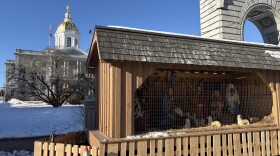As climate change causes warmer and shorter winters, we may see less snow in many places, including New Hampshire. And some places are already starting to experience significantly less snow accumulation than normal, something that researchers call a “snow drought.”
But there’s no universally agreed-upon definition of a snow drought, how to measure one, or how snow droughts connect to the droughts we experience in warmer seasons.
In a new paper from Dartmouth, researchers Alex Gottlieb and Justin Mankin explored the uncertainties that arise from different ways of measuring and defining snow droughts, and how those different measurements could help us predict their impacts on our ecosystems – especially droughts in warmer seasons.
They found they could use data to draw conclusions about the consequences of snow droughts and make better forecasts about warm-season droughts, even amid the uncertainties.
Even though snow droughts are hard to measure, Gottlieb and Mankin say information about snow droughts could be important to future risk management efforts, as the world adapts to climate change.
Mankin, an assistant professor at Dartmouth, says snow can have a big impact on our ecosystems – from replenishing our water supply, to killing harmful pests, to affecting our ski season.
“When snowpack accumulates on the ground, it does a better job of recharging soils and recharging groundwater aquifers that we rely on for things like water supply. For those in New Hampshire that have wells, that kind of recharge is really essential,” he said.
Snow, and how it’s changing, is hard for scientists to measure, said Gottlieb, a Dartmouth PhD candidate and the lead author on the recent paper.
“You go stick a meter stick in the ground and you can figure out how much snow is there. You can melt it. You could figure out how much water is in the snowpack at that point, but say you walk off into the woods or you walk up the hillside a little bit and you repeat the same process and you could get a very different answer,” he said.
Scaled up, it’s difficult to measure how much water is contained in the snow at all the geographic scales of something like a river bed, Gottlieb said.
For the recent paper, Gottlieb used about 16 data sets, including observations from satellites in space, computer simulations of snow accumulation and melt, and observations of snow in locations across the globe.
He found that information about snow droughts improves our ability to predict warm-season droughts, especially when all the different measurements and definitions are used together.
One of the team’s hopes is that the National Integrated Drought Information System, which provides drought information in the U.S., uses multiple measures of snowpack to inform their predictions for warm-season drought in the future.
And, Gottlieb says, his research shows how uncertainty doesn’t have to get in the way of action.
“Even in these components of the Earth system like snow, where we have substantial amounts of observational uncertainty, we don't need to be paralyzed by that or just use it as an excuse for inaction,” he said. “We can really leverage that uncertainty to understand the phenomenon that we're trying to study better…and generate much better predictions of what that might mean downstream.”








